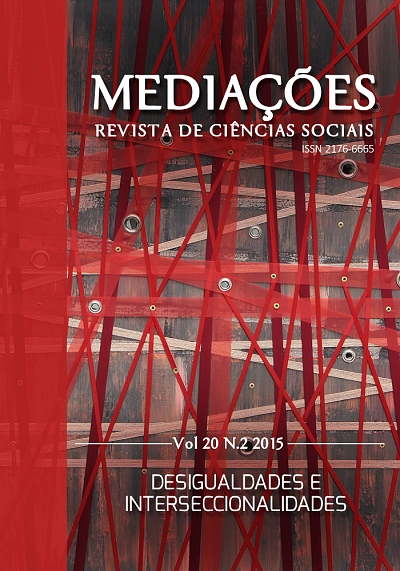Gender, race, and class: intersecting oppressions and convergences reproducing inequalities
DOI:
https://doi.org/10.5433/2176-6665.2015v20n2p27Keywords:
Genre, Class, Races, Intersectionality, InequalitiesAbstract
The article analyses approaches to the convergences between gender, class and race within theoretical debates in the last decades, focusing especially on feminism. It aims to present a broad and non-homogeneous field of researches, that has as a common ground the understanding that oppressions are multiple and complex and it is not possible to understand social inequalities when one variable is taken separately. The relative prominence of each axe, its meaning and the comprehension of the way they operate together vary in the three different sets of approaches discussed in the article: marxist or socialist feminism, black feminism, and the studies of intersectionalities.Downloads
References
BADINTER, Elizabeth. O amor incerto: história do amor maternal do século XVII ao século XX. Lisboa: Relógio D’Água, 1985.
BAIRROS, Luiza. Lembrando Lélia Gonzalez, 1935-1994. Afroasia, Salvador, n. 23, 2000.
BERNARDINO-COSTA, Joaze. Intersectionality and female domestic worker`s unions in Brazil. Women’s Studies International Forum, Oxford, n. 46, p. 72-80, 2014.
BILGE, Sirma. Théorisations feminists de l’intersectionnalité. Diogène Revue Internationale des Sciences Humaines, Paris, n. 225, p. 158-76, 2009.
BIROLI, Flávia. Divisão sexual do trabalho e democracia. In: ENCONTRO DA ANPOCS, 39., 2015, Caxambu. Paper... Caxambu: Anpoc, 2015a.
BIROLI, Flávia. Responsabilidades, cuidado e democracia. Revista Brasileira de Ciência Política, Brasília, n. 18, p. 81-117, 2015b.
BRUSCHINI, Cristina; LOMBARDI, Maria Rosa. A bipolaridade do trabalho feminino no Brasil contemporâneo. Cadernos de Pesquisa, São Paulo, n. 110, p. 67- 104, 2000.
CARNEIRO, Sueli. Racismo, sexismo e desigualdade no Brasil. São Paulo: Selo Negro, 2011.
COLLINS, Patricia Hill. Black feminist thought: knowledge, consciousness, and the politics of empowerment. New York: Routledge, 2009.
COLLINS, Patricia Hill. Intersectionality’s definitional dilemas. Annual Review of Sociology, Palo Alto, n. 41, p. 1-20, 2015.
CRENSHAW, Kimberle. Documento para o Encontro de especialistas em aspectos da discriminação racial relativos ao gênero. Revista Estudos Feministas, Rio de Janeiro, v. 10, n. 1, p. 171-187, 2002.
DAVIS, Angela. Women, race, and class. New York: Vintage Books, 1983.
DELPHY, Christine. L’ennemi principal. 1. Économie politique du patriarcat. Paris: Syllepse. 2013
DENIS, Ann. Intersectional analysis: a contribution of feminism to Sociology. International Sociology, London, v. 23, n. 5, p. 677-94, 2008.
ENGELS, Friedrich A origem da família, da propriedade privada e do Estado. Rio de Janeiro: Civilização Brasileira, 1985.
FIGUEROA, Aurora Vergara; HURTADO, Katherine Arboleda. Feminismo afrodiaspórico: uma agenda emergente del feminismo negro em Colombia. Universitas Humanística, Bogotá, n. 78, p. 109-34, 2014.
HANCOCK, Ange-Marie. Intersectionality as a normative and empirical paradigma. Politics & Gender, Cambridge, v. 2, n. 3, p. 248-54, 2007.
HARTMANN, Heidi. Capitalism, patriarchy, and job segregation by sex. In: EISENSTEIN, Zillah R. (Ed.). Capitalist patriarchy and the case for socialist feminism. New York: Monthly Review Press, 1979.
HARTMANN, Heidi. The unhappy marriage of Marxism and feminism: towards a more progressive union. In: NICOLSON, Linda (Ed.). The second wave: a reader in feminist theory. New York: Routledge, 1997.
HARTSOCK, Nancy C. M. The feminist standpoint: developing the ground for a specifically feminist historical materialism. In: HARDING, Sandra. The feminist standpoint. Boulder: Westview, 1998.
HOOKS, Bell. Feminist theory: from margin to center. Boston: South End Press, 1984.
IBGE. Pesquisa Nacional por Amostra de Domicílios. Brasília: Instituto Brasileiro de Geografia e Estatística, 2014.
IPEA. Retratos das desigualdades de gênero e raça. Brasília: Instituto de Pesquisa Econômica Aplicada, 2014. Disponível em: Acesso em: 15 maio 2015.
JONES, Claudia. An end to the neglect of the problems of the Negro woman! In: BEVERLY, Guy-Sheftall (Ed.). Words of fire: an anthology of African-American feminist thought. New York: The New Press. 1995.
KERGOAT, Danièle. Dinâmica e consubstancialidade das relações sociais. Novos Estudos, n. 86, p. 93-103, São Paulo, 2010.
KOLLONTAI, Alexandra. Working woman and mother, em Selected writings. New York: Norton, 1977.
MIGUEL, Luis Felipe; BIROLI, Flávia. Feminismo e política: uma introdução. São Paulo: Boitempo Editorial, 2014.
MITCHELL, Juliet. Psychoanalysis and feminism: Freud, Reich, Laing, and women. New York: Pantheon Books, 1974.
PHILLIPS, Anne. The politics of presence. Oxford: Oxford University Press, 1995.
RATTS, Alex. As amefricanas: mulheres negras e feminismo na trajetória de Lélia Gonzales. In: SEMINÁRIO INTERNACIONAL FAZENDO GÊNERO, 9., 2010, Florianópolis. Anais... Florianópolis: Universidade Federal de Santa Catarina, 2010. Disponível em: http://www.fg2010.wwc2017.eventos.dype.com.br/. Acesso em: 15 maio 2015.
RATTS, Alex; RIOS, Flávia. Lélia Gonzalez. São Paulo: Selo Negro, 2010.
ROSANVALLON, Pierre. La nouvelle question sociale: repenser l’État-providence. Paris: Seuil, 1995.
ROSANVALLON, Pierre. La société des égaux. Paris: Seuil, 2011.
SAFFIOTI, Heleieth. A mulher na sociedade de classes: mito e realidade. São Paulo: Expressão Popular, 2013.
SOUZA-LOBO, Elizabeth. A classe operária tem dois sexos: trabalho, dominação e resistência. São Paulo: Brasiliense, 1991.
SPELMAN, Elizabeth. Inessential woman: problems of exclusion in feminist thought. Boston: Beacon Press. 1988.
WERNECK, Jurema. Nossos passos vêm de longe! Movimentos de mulheres negras e estratégias políticas contra o sexismo e o racismo. Revista da ABPN, Rio de Janeiro v. 1, n. 1; p. 8-17, 2010.
YOUNG, Iris Marion. Beyond the unhappy marriage: a critique of the dual systems theory. In: SARGENT, Linda (Ed.). Women and revolution: a discussion of the unhappy marriage betweem feminism and Marxism. Boston: South End Press, 1981.
YOUNG, Iris Marion. Socialist feminism and the limits of dual systems theory. In: YOUNG, Iris Marion. Throwing like a girl and other essays in feminist philosophy and social theory. Bloomington: Indiana University Press, 1990.
Downloads
Published
How to Cite
Issue
Section
License
Copyright on articles published in Mediações belongs to the author(s): in the case of partial or entire republication of the original publication, we ask author(s) to indicate the original publication in the periodical.
Mediações uses the Creative Commons Attribution 4.0 International license, which allows Open Access, enabling any user to read, download, copy and disseminate its content so long as adequately referenced.
The opinions expressed by the author(s) are their sole responsibility.
































